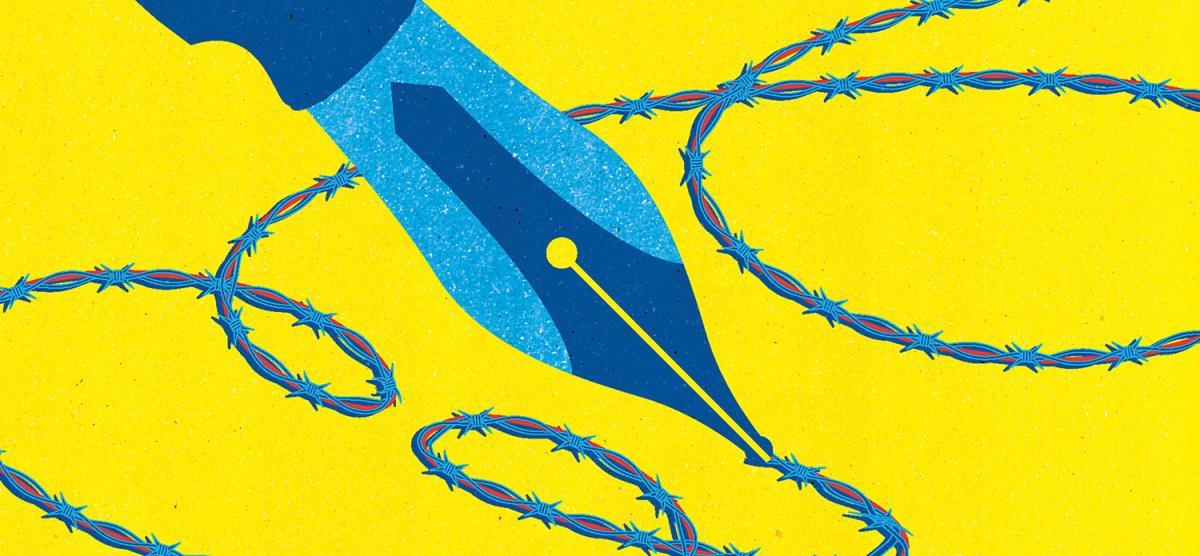
On Rikers, Writing to Connect
Empowerment through words is the goal at NYC's foreboding jail.
The women straggle into my creative writing workshop. They come in jittery, gloomy, timid, angry, boisterous, loud. They settle into a circle of chairs around a large table. The room is spare but clean and bright. Sun pours in through windows. The only difference between this and an ordinary classroom is that the windows are barred, and the women are wearing uniforms—khaki (detainees) or green (sentenced inmates). I hand out sheets of paper and short “golf” pencils. Regular pencils and pens are banned; they could be used as weapons.
“We’ll begin with a freewrite,” I tell them, “a warm-up to stretch our writing minds.” I’m not being condescending; I write along with the group. “You can write a journal entry, a poem, a to-do list, a letter, a rant. You can write a true story or make things up. Just sit with your feelings and see what comes to mind.”
有些人直接潜入. Others stare off into space. 的骚动, 喋喋不休, and jostling continue for a while, 直到它慢慢死去, and all I hear is the scratching of pencils on paper. The workshop has begun. We are on Rikers Island—the New York City jail sometimes called the largest penal colony in the world—in the women’s facility known as the Rose M. Singer Center, Rosie’s for short. It’s a drop-in workshop. Anyone can come; they don’t have to sign up in advance. 有些人只来一次. 有些人成为常客. One woman has been in the workshop for almost two years. I’ve been leading the workshop, once a week, for nearly six years.
The first time I went to Rikers Island, I felt called. The long corridors with cracked linoleum, the endless mechanical gates, the bags of stinking garbage in the halls, the bleak cement courtyard—spoke to me of an island of discarded people.
I graduated from 布林莫尔 as a fine arts major in 1972 and went on to be a painter, showing my work in a co-op gallery in downtown Manhattan in the ’80s. Somewhere in the ’90s, I got frustrated with my career and transitioned into writing fiction, 首先是儿童, 那么成年人. 一路走来, I encountered the NY Writers Coalition, dedicated to offering free creative writing workshops to underserved people around New York City. I learned the workshop method, trained to become a leader, and went on to become program director of NYWC for eight years. I continued to lead workshops—for seniors, 给无家可归的人, for adults in basic education programs, for folks in public housing. Wherever I went, I found people with strong and beautiful voices waiting to be heard.
The first time I went to Rikers Island, I felt called. The long corridors with cracked linoleum, the endless mechanical gates, the bags of stinking garbage in the halls, the bleak cement courtyard—spoke to me of an island of discarded people. Out of that grim setting have come words of raw emotion and beauty, like the poem by Astarra included here.
After the freewrite I will offer a writing prompt, but it is al方法 a suggestion. The women can write whatever they want. After the writing time, they are given a chance to read their new writing out loud, but they never have to read. The group will tell them what they like in the writing; they will not criticize. At the end of the workshop, they will walk out a little more hopeful, a little more joyous than when they came in.
More than 850 women have participated in my workshop over the six years. NY Writers Coalition published a book of their writing, These are Hard Times for Dreamers, and we are working on another. We celebrated the book with a reading in the jail by workshop members, 哪些犯人, 校正人员, and outside guests were invited. Being heard, seeing your words on the page, is an empowering experience for any writer. No one has been more transformed by their voices than have I.
Deborah Chadwick Clearman ’72 is the author of the novel Todos Santos 还有一个收藏, Concepción and the Baby Brokers and Other Stories Out of Guatemala, forthcoming in March 2017. She lives in New York City and Guatemala.
I came home from school and there she was again, thinking I’m a fool nodding out while sitting at 厨房的桌子.
You don’t know how bad I wish I was able—able to stop her from getting high but that’s impossible, like wishing 我可以飞翔.
I was only seven years old and all the jewelry I had that was gold was sold, I was robbed of being a child.
I grew up in a lifestyle that 是野生的.
I remember picking her face up from a bowl of soup, her eyes al方法 seeming to 下垂.
Then I found her with a 她手里拿着针. 我希望我 在另一片土地上.
Mom, please change your 方法.
I don’t want to countdown 你的日子.
I love you to the moon 和背部.
I don’t want you to think this is an attack; it’s just me reaching out cause I love you.
-Astarra
